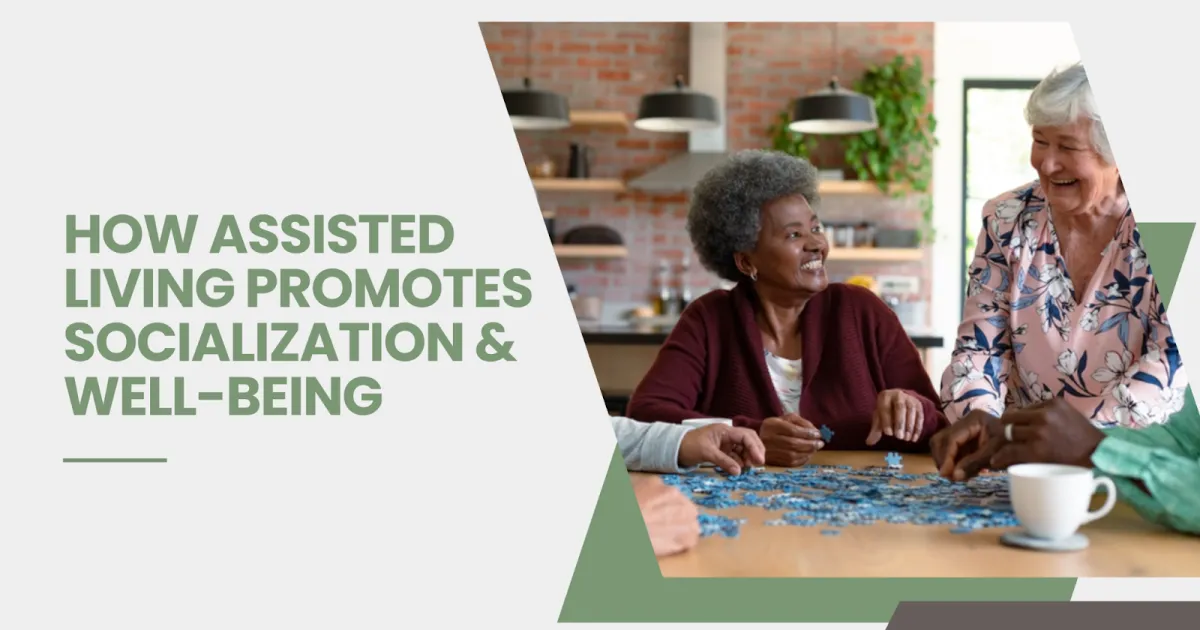
How Assisted Living Promotes Socialization & WellBeing
A few years ago, Mary, a retired teacher in her late 70s, found herself struggling with loneliness after her children moved away. Although her home was full of memories, the long days spent in isolation became more and more difficult. Despite her best efforts, she didn’t feel as connected to her community as she once had.
The days blended, and she realized that the social isolation she faced was affecting her overall well-being. Her doctor suggested she explore community living for elderly options, where she could find new ways to engage with others and in enriching activities. After some hesitation, she chose an assisted living community, and her life began to transform in ways she hadn’t imagined.
The transition was smoother than Mary expected, and before long, she explored how senior social activities helped her reconnect with others, fostering friendships and enhancing her mental and emotional health. This story illustrates how important it is for seniors to maintain social connections and how assisted living can serve as a bridge to a vibrant, fulfilling life.
The Problem: Social Isolation in Seniors
As people age, many face challenges that can lead to feelings of loneliness and isolation. These issues can arise for various reasons, including health concerns, limited mobility, or the loss of family and friends. According to studies, social isolation in seniors is not just an emotional problem; it also has serious consequences for physical and mental health. Isolated seniors are more likely to experience:
Depression
Cognitive decline
Weakened immune system
Increased mortality rates
However, the idea of transitioning to community living for the elderly can seem daunting. Many seniors resist the notion of moving from their familiar homes, fearing that they will lose the connections and independence they've enjoyed. Yet, this very change can be the key to improving their social life and overall health.
How Assisted Living Addresses Socialization Needs
Assisted living communities are designed to offer much more than just basic care—they provide an environment that fosters social interaction and a sense of belonging. By introducing structured programs and spontaneous opportunities for connection, these communities create a dynamic space where residents can thrive.
1. Senior Social Activities: A Pathway to Connection
One of the key features of assisted living is its focus on senior social activities. These activities are carefully planned to appeal to a variety of interests, confirming that there is something for everyone. These activities include:
Fitness classes (yoga, stretching, walking clubs)
Arts and crafts (painting, knitting, pottery)
Group outings (museum visits, shopping trips, nature walks)
Game nights (board games, cards, trivia)
Social clubs (book clubs, movie nights, gardening)
By participating in these activities, seniors build strong bonds with peers who share similar interests. This sense of connection can significantly reduce feelings of loneliness, offering both emotional and mental benefits.
2. Community Living for the Elderly: A Supportive Environment
Moving into community living for the elderly is not just about physical space—it's about creating a network of support. Assisted living communities are designed to nurture residents' social needs, offering various communal spaces where people can meet, chat, and engage in informal activities. These spaces include:
Common dining areas (Encourages meal-sharing and conversation)
Lounge areas (perfect for casual conversations and bonding)
Private rooms for one-on-one interactions (for quieter, more personal moments)
Additionally, assisted living staff often play a key role in promoting socialization. Many facilities have social coordinators who actively encourage residents to participate in group activities or organize special events to bring everyone together. These efforts confirm that residents are not left to their own devices but are consistently engaged in meaningful social experiences.
3. The Benefits of Socialization for Seniors
Engaging in regular social interactions can have profound benefits for seniors' well-being. These benefits include:
Improved cognitive health
Reduced feelings of loneliness and depression
Increased emotional support
Better physical health due to more active lifestyles
Studies have shown that socially active seniors are less likely to experience cognitive decline, depression, and physical health issues. Socialization improves mental stimulation, reduces stress, and improves overall quality of life.
Moreover, when seniors are part of a supportive community, they are more likely to feel a sense of purpose and belonging. This can lead to improved emotional resilience and a greater sense of autonomy, which is essential for maintaining a high quality of life as one ages.
4. Physical Health and Emotional Well-Being Through Social Engagement
Socializing isn’t just beneficial for mental health—it can also lead to better physical health. Seniors who participate in social activities tend to be more active, which can help prevent common age-related health issues such as
Arthritis
Heart disease
Mobility challenges
Physical activities, such as walking groups or gentle stretching classes, not only promote physical fitness but also create opportunities for bonding and support among residents. Additionally, the emotional benefits are significant. Being around friends and participating in group activities can help alleviate feelings of sadness, anxiety, and depression. This is crucial for seniors who may be grieving the loss of loved ones or struggling with major life transitions.
5. Cognitive Health and the Role of Mental Stimulation
Keeping the mind active is just as important as staying physically active. Assisted living communities often offer mental stimulation through:
Puzzles and brain games
Educational seminars and workshops
Social clubs (book clubs, discussion groups, etc.)
These types of activities help keep the brain sharp and reduce the risk of cognitive decline. Social interactions themselves provide mental stimulation, as they require cognitive functions such as memory, attention, and problem-solving. By participating in activities that challenge the mind, seniors can improve their cognitive health and maintain a sense of independence and purpose.
Transitioning to Assisted Living: Making the Move
The decision to move to assisted living can be a difficult one, but it’s important to consider the long-term benefits of socialization and well-being. For many seniors, the move is not just about gaining assistance with daily tasks but also about creating a new chapter of life filled with opportunities for connection and growth.
It's essential to view the transition to assisted living as an opportunity for enrichment. Communities are designed to support individuals in every aspect of their lives, from personal care to fostering relationships. For seniors like Mary, this new environment can be the key to finding purpose, joy, and emotional well-being.
FAQs
1. How do senior social activities support brain health?
They keep the mind active through conversation, games, and learning. Regular engagement helps reduce memory loss and supports emotional well-being in older adults.
2. Why is community living for the elderly better than living alone?
It provides safety, companionship, and daily support. Seniors feel more secure and connected, which improves both physical and mental health over time.
3. What are the emotional benefits of assisted living?
Seniors in assisted living experience less loneliness and more purpose. Social interaction, routine, and compassionate care uplift their mood and reduce anxiety.
4. Can senior social activities lower health risks?
Yes, regular social interaction encourages movement and reduces stress. Both factors are key in preventing chronic illness and boosting overall wellness in seniors.
5. How does assisted living support daily independence?
It offers the right help without taking away freedom. Seniors enjoy privacy and autonomy while still having access to care when needed.
Conclusion
In conclusion, assisted living communities provide more than just a place to live—they offer an environment that promotes socialization and improves well-being. By encouraging participation in senior social activities, fostering supportive relationships, and offering mental and physical health benefits, these communities create spaces where seniors can thrive. While the decision to move to an assisted living facility may feel overwhelming at first, it can lead to profound improvements in social connection, mental health, and overall quality of life.
If you or a loved one is considering community living for the elderly, the benefits of socialization and well-being should be an essential part of the decision-making process. Embrace the opportunity for a fulfilling, socially rich life in a supportive community.
Ready to explore the benefits of assisted living for yourself or a loved one? Schedule your visit today at The Walnut Villa and explore a vibrant, supportive lifestyle!

Facebook
Instagram